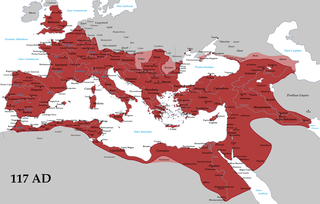Gaius Catius Clemens (fl. 3rd century AD) was a Roman military officer and senator who was appointed suffect consul around AD 235.

The Roman Empire was the post-Roman Republic period of the ancient Roman civilization. Ruled by emperors, it had large territorial holdings around the Mediterranean Sea in Europe, North Africa, and West Asia. From the constitutional reforms of Augustus to the military anarchy of the third century, the Empire was a principate ruled from the city of Rome. The Roman Empire was then divided between a Western Roman Empire, based in Milan and later Ravenna, and an Eastern Roman Empire, based in Nicomedia and later Constantinople, and it was ruled by multiple emperors.

The Senate of the Roman Empire was a political institution in the ancient Roman Empire. After the fall of the Roman Republic, the constitutional balance of power shifted from the "Roman Senate" to the "Roman Emperor." Beginning with the first emperor, Augustus, the Emperor and the Senate were technically two co-equal branches of government. In practice, however the actual authority of the imperial Senate was negligible, as the Emperor held the true power of the state. As such, membership in the Senate became sought after by individuals seeking prestige and social standing, rather than actual authority. During the reigns of the first Emperors, legislative, judicial, and electoral powers were all transferred from the "Roman assemblies" to the Senate. However, since the control that the Emperor held over the senate was absolute, the Senate acted as a vehicle through which the Emperor exercised his autocratic powers.

A consul held the highest elected political office of the Roman Republic, and ancient Romans considered the consulship the highest level of the cursus honorum.


